One of the things I’ve truly come to appreciate about having a Netflix account is the ability to go back and watch shows that I didn’t have time for when they were on the air. One such example is Charmed.
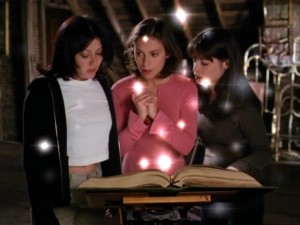 The show follows three witches (played by Shannen Doherty, Alyssa Milano, Holly Marie Combs and later Rose McGowan) as they come to terms with their powers and their responsibilities. If that was all the show was about, I think it would have been perfect. Unfortunately, too many factors came in to screw this one up.
The show follows three witches (played by Shannen Doherty, Alyssa Milano, Holly Marie Combs and later Rose McGowan) as they come to terms with their powers and their responsibilities. If that was all the show was about, I think it would have been perfect. Unfortunately, too many factors came in to screw this one up.
I guess the first thing one notices when watching this show is the amazing effect that being on The WB network had on the production. The WB was Warner Bros’ foray into network television. Its main staples were teen dramas like Smallville and Buffy the Vampire Slayer. As a result of such a specifically targeted audience, you’d frequently see these commercials at the end of each episode for where you could buy the music that was featured in that week’s episode.
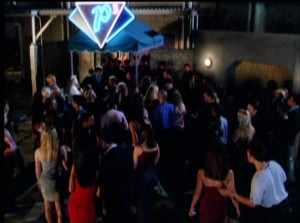 Ostensibly, this was a way to help pay for production costs by giving promotional consideration to the bands featured. What this also meant was that the music sometimes took on an amazingly substantial and sometimes inappropriate importance. For example, most (and I’d say about 98%) episodes, after the opening credits finished, would have a montage of San Francisco shots (where the show took place) edited over an overly ebullient piece of music which sometimes ran counter to the tone set just before the credits. It was weird.
Ostensibly, this was a way to help pay for production costs by giving promotional consideration to the bands featured. What this also meant was that the music sometimes took on an amazingly substantial and sometimes inappropriate importance. For example, most (and I’d say about 98%) episodes, after the opening credits finished, would have a montage of San Francisco shots (where the show took place) edited over an overly ebullient piece of music which sometimes ran counter to the tone set just before the credits. It was weird.
Also, to help facilitate this, the show’s characters bought a night club in the second season which would, of course, feature a band-of-the-week. Somehow, while less insidious than the current in-show branding (Subway on “Chuck” or various characters in shows describing in uncanny detail their car’s capabilities), it still got to be slightly annoying.
Another aspect of the series which was a bit tough to swallow was the show’s inescapable struggle for relevance. Much like film companies try to capitalize on the “latest craze” in films, Charmed also followed suit. One episode saw the inclusion of pirates including a certain “Captain Black Jack Cutting” who’s searching for the fountain of youth. Another spent time in the Demon Market (à la Hellboy). But the most glaring example of this was the introduction of the “Magic School” in later seasons. 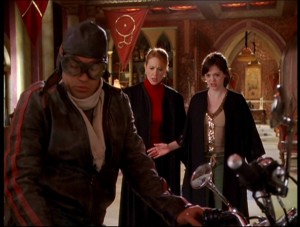 The Magic School, which was never given a proper name, was a place where young children went to learn to use their magical powers. Doing the math, this was roughly when Harry Potter started getting a real head of steam. No coincidence here, by the way, that the show aired on The WB and that Warners was producing the Potter films. Charmed was produced by Paramount.
The Magic School, which was never given a proper name, was a place where young children went to learn to use their magical powers. Doing the math, this was roughly when Harry Potter started getting a real head of steam. No coincidence here, by the way, that the show aired on The WB and that Warners was producing the Potter films. Charmed was produced by Paramount.
Charmed was also on long enough that it fell into every single television trope that a genre show can have. Time-travel episodes, body-swap episodes, episodes where the characters turn evil, wedding episodes… all of which are more-or-less forgivable, but the idea here is that the show wound up so far from where it began that you really do get the idea that you’re watching two programs.
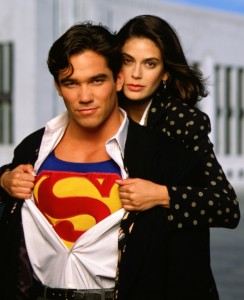 It’s here that I want to draw a comparison to a similar show… Lois & Clark: The New Adventures of Superman. The show was brought to television by Deborah Joy Levine, who seemed to find a decent balance for the show in its first season. Levine’s show was very much in the vein of Moonlighting, with sexy banter between the two leads (Lois and Clark as played by Teri Hatcher and Dean Cain respectively), and no immediate promise of them getting together. The show was set in as close to the real world as television would allow at the time.
It’s here that I want to draw a comparison to a similar show… Lois & Clark: The New Adventures of Superman. The show was brought to television by Deborah Joy Levine, who seemed to find a decent balance for the show in its first season. Levine’s show was very much in the vein of Moonlighting, with sexy banter between the two leads (Lois and Clark as played by Teri Hatcher and Dean Cain respectively), and no immediate promise of them getting together. The show was set in as close to the real world as television would allow at the time.
In its second season, Levine was replaced as show-runner and the show began to emphasize Superman stories over Lois & Clark stories. As a result, the villains got campier and the show almost turned into the Adam West Batman show, with celebrities vying for a spot as the baddie-of-the-week.
Charmed had a similar problem, though it took a little longer to manifest. The show was created by Constance M. Burge, who had infused the show with a very down-to-Earth vibe (despite the show’s supernatural themes). The shows took a very “demon-of-the-week” vibe, which worked towards keeping the mythology of the show to a reasonably manageable size (more on this in a minute). Due to creative differences, however, Burge stepped down by season four. The show took on a slightly more serialized format and began to expand on the mythology of the Charmed universe.
The new direction gave unprecedented access to the vast history of the Charmed characters and to the world that they live in. Sometimes this worked well, other times it became a convoluted mess. Eventually it led to a headache so large that it would make Terminator fans tremble. For an entire season we were treated to a character from the future who was trying to change it. He messed with the characters like chess pieces, but even this wasn’t bad enough. In later seasons, the characters saw visions of the future and tried to maneuver their lives so that the future would come to pass.
Even this doesn’t compare to the awe-inspiring, headache-inducing final episode where characters from the past and the future all pitch in to make the right future happen. Don’t even ask how the future incarnations are aware that their reality is changing around them… there just aren’t words. The solution to the past characters not remembering the future they saw harkens back to the Star Trek episode “Tomorrrow Is Yesterday”… and made about as much sense.
Towards the end of its run, I would level a similar criticism at Charmed as was leveled at Doctor Who in the ’80s and most modern-day Star Trek from before the Abrams reboot: it began to choke on its own continuity, to the point where it became somewhat off-putting.
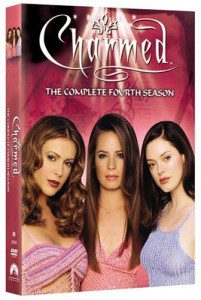 But let’s give Charmed a similar kudos to Doctor Who… the ability to roll with the punches behind the scenes. When Shannen Doherty got into legal trouble (once again), she was dismissed from the show and her character killed off. Due to the necessity of three sister-witches for the show to work, the writers had to come up with a never-before-seen new third sister. Enter Rose McGowan’s character of Paige Matthews. Paige was written in as a half-sister who was sent away to foster care. It was somewhat soap-opera-like, but not only does it work within the framework of the show, but it is one of the few instances where such a move actually served to enrich the tapestry of the Charmed universe. It provided some of the best story moments in its introductory season as well as some tasty emotional nuggets later on.
But let’s give Charmed a similar kudos to Doctor Who… the ability to roll with the punches behind the scenes. When Shannen Doherty got into legal trouble (once again), she was dismissed from the show and her character killed off. Due to the necessity of three sister-witches for the show to work, the writers had to come up with a never-before-seen new third sister. Enter Rose McGowan’s character of Paige Matthews. Paige was written in as a half-sister who was sent away to foster care. It was somewhat soap-opera-like, but not only does it work within the framework of the show, but it is one of the few instances where such a move actually served to enrich the tapestry of the Charmed universe. It provided some of the best story moments in its introductory season as well as some tasty emotional nuggets later on.
Unfortunately, by the end of the show, McGowan’s character became a bit annoying. Whether this was a result of bad writing or McGowan just not trying as hard as she had in her freshman seasons, the character just lost a lot of her emotional gravitas and became kind of a caricature in and of itself.
Combs and Milano, however, kept on their game from the beginning to the very end. Their acting stood apart and elevated the sometimes mediocre writing of the show to something more than palatable.
 The show is also notable for a pre-Nip/Tuck Julian McMahon making a multi-season appearance as the love interest of Milano’s character Phoebe Halliwell. And, if you’re looking for incredible performances for weekly television, check out the scenery-chewing Billy Zane showing up for a mini-arc as a demon-turned-human teacher at Magic School. His performance is over-the-top but delightful nonetheless.
The show is also notable for a pre-Nip/Tuck Julian McMahon making a multi-season appearance as the love interest of Milano’s character Phoebe Halliwell. And, if you’re looking for incredible performances for weekly television, check out the scenery-chewing Billy Zane showing up for a mini-arc as a demon-turned-human teacher at Magic School. His performance is over-the-top but delightful nonetheless.
Honestly, I would have to say that despite the left-turns and missteps, I enjoyed the show overall. But much like Buffy the Vampire Slayer, it just went on too long. It stuck around long enough to cancel out most of the good that it had done. And much like BTVS, Charmed had some great episodes in its final seasons, but it just wasn’t enough to make these seasons worthwhile.
I highly recommend the show for anyone who enjoys the genre. But I would say this… don’t feel you need to be a completest about it. Get off when it feels right. You’ll be fine. And you won’t miss much. If anything you’ll save yourself from the headache-inducing final episodes. 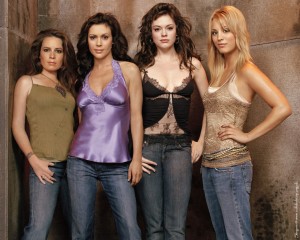 On the flipside, if you bail early, you will miss a pre-Big Bang Theory Kaley Cuoco as a demon-fighting witch with some incredible superpowers who sticks around for the entire final season.
On the flipside, if you bail early, you will miss a pre-Big Bang Theory Kaley Cuoco as a demon-fighting witch with some incredible superpowers who sticks around for the entire final season.
A note about Charmed for those who missed its first run. It’s the second series that I’ve found in which the opening theme is replaced in the DVD/Netflix releases. Evidently, the theme to the show was the Psychedelic Furs’ cover of the Smiths’ “How Soon is Now?”.
On Netflix, this is replaced by an instrumental track that is a bit more action-driven, though would probably make purists puke. The other show that had its opening theme replaced (that I have found so far)? Brace yourselves…
Married With Children!
Huh do you feel that Fringe misled you? I didn’t ever think it was about lngeas, but I was also not watching too carefully in the first season because the science drove me nuts. Not that they did well fringe stuff or impossible things, but that they would screw up on simple facts from the real world. They could have avoided those screw-ups with five minutes on Wikipedia. It was especially galling because the scripts would be intelligent in other respects. Then I realized neither of the show’s dimensions is our dimension. I think the science fuck-ups are hints. Maybe I’m just fanwanking, but the scripts really are intelligent and the mistakes so obvious and dumb it honestly seems the most likely explanation.